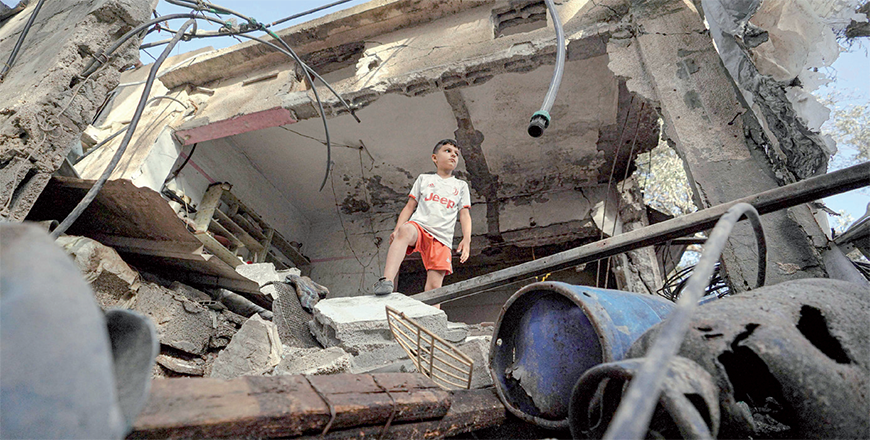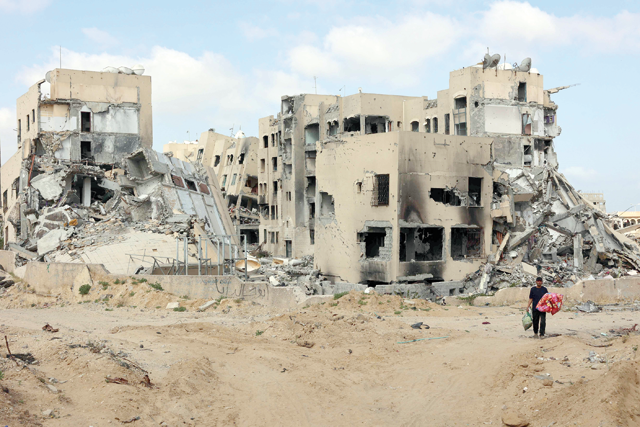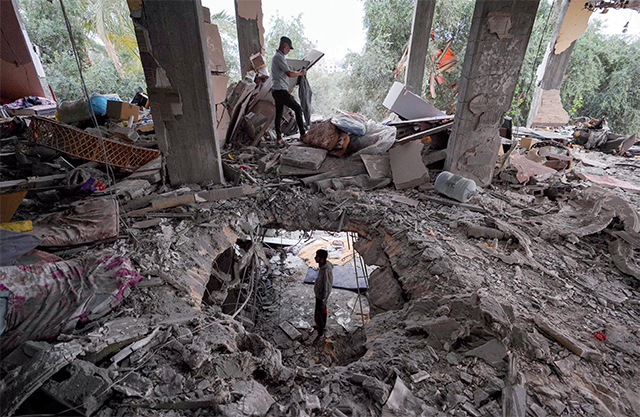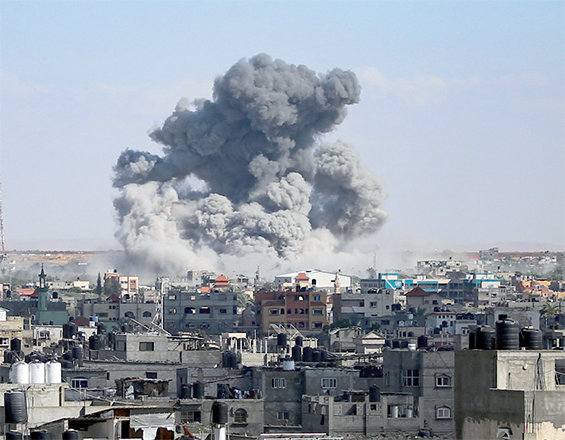You are here
Israel launches deadly Gaza strikes, says ready for new truce talks
By AFP - May 24,2024 - Last updated at May 24,2024

A Palestinian boy stands on the rubble of a destroyed house in Nuseirat following Israeli bombardment overnight on May 23, 2024 (AFP photo)
OCCUPIED PALESTINE — Israel launched devastating air strikes on Gaza early Thursday while also saying it is ready to resume stalled talks on a truce and hostage release deal with Hamas to pause the war raging since October 7.
The Gaza Strip's civil defence agency said two pre-dawn air strikes had killed 26 people, including 15 children, in Gaza City alone.
Agency spokesman Mahmud Bassal said one strike hit a family house, killing 16 people, in the Al Daraj area, and another killed 10 people inside a mosque compound.
There was no immediate comment from the Israeli military.
Fierce street battles also raged in Gaza's Jabalia and Rafah where the armed wings of Hamas and its ally Islamic Jihad said they had fired mortar barrages at Israeli troops.
International pressure for a ceasefire has mounted on Israel and its prime minister Benjamin Netanyahu as three European countries said Wednesday they would recognise a Palestinian state.
The week started with the International Criminal Court's (ICC's) prosecutor seeking arrest warrants on war crimes charges against Netanyahu and his defence minister as well as three Hamas leaders.
Israel has angrily rejected those moves, voicing "disgust" over the ICC request and labelling any recognition of Palestinian statehood a "reward for terrorism".
But domestic pressure has also risen as supporters of hostages trapped in Gaza again rallied outside Netanyahu's office, passionately demanding a deal to bring them home.
Bleak assessment
The previous round of truce talks, involving US, Egyptian and Qatari mediators, ended shortly after Israel launched its attack on Gaza's far-southern city of Rafah early this month.
Israel went ahead with the assault on the last city in Gaza to be entered by its ground troops in defiance of global opposition, including from top ally the United States.
Washington voiced concerns that about 1.4 million Palestinians who had been trapped in the city would be caught in the line of fire.
Israel has since ordered mass evacuations from the city, and the UN says more than 800,000 people have fled.
US President Joe Biden’s national security advisor, Jake Sullivan, said the Rafah operation “has been more targeted and limited” than feared and “has not involved major military operations into the heart of dense urban areas”.
But he stopped short of saying that Israel had addressed US concerns, adding that Washington was closely watching ongoing Israeli actions.
Israel’s national security adviser Tzachi Hanegbi has meanwhile given a bleak assessment of the war to a meeting of parliament’s foreign affairs and defence committee, according to a report by Israel’s Channel 13.
He reportedly said that Israel has “not achieved any of the strategic aims of the war — not conditions for a hostage deal; we haven’t toppled Hamas; and we haven’t allowed residents of the [Gaza] periphery to safely return home”.
‘Cycles of violence’
The bloodiest ever Gaza war broke out after Hamas’s unprecedented attack on October 7 on Israel. Israel’s retaliatory offensive has killed at least 35,800 people in Gaza, mostly women and children, according to the Hamas-run territory’s health ministry.
Israel has also imposed a siege that has deprived Gaza’s 2.4 million people of most clean water, food, medicines and fuel.
The sporadic arrival of aid by truck slowed further after Israeli forces took control of the Palestinian side of the Rafah border crossing with Egypt.
Israel has faced ever greater opposition to the bloody war from around the world, and pro-Palestinian protests have swept university campuses.
Israel reacted with fury after Ireland, Norway and Spain said they would recognise a Palestinian state on May 28, a move praised by Palestinians and across the Arab world.
Israel recalled its envoys to Dublin, Oslo and Madrid and summoned the three ambassadors for a rebuke.
Most Western governments say they are willing to recognise Palestinian statehood one day, but not before thorny issues such as final borders and the status of Jerusalem are settled.
The White House said Biden opposed unilateral recognition of a Palestinian state, saying it should be realised “through direct negotiations”.
Irish Prime Minister Simon Harris called the October 7 attack “barbaric” but stressed that “a two-state solution is the only way out of the generational cycles of violence”.
Related Articles
GAZA STRIP, Palestinian Territories — Talks resumed in Egypt Saturday aimed at halting months of war in Gaza between Hamas militants and Isr
RAFAH, Palestinian Territories — Israel announced on Monday the deaths of four captives held in Gaza amid growing doubts and international p
RAFAH, Palestinian Territories — Israel's military on Monday called for the evacuation of Palestinians from eastern Rafah ahead of a ground



















